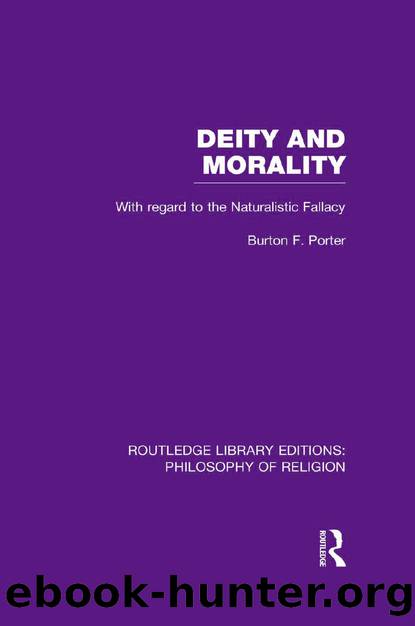Deity and Morality by Porter Burton F.;

Author:Porter, Burton F.;
Language: eng
Format: epub
Publisher: Taylor & Francis Group
Published: 1968-08-15T00:00:00+00:00
B: Myths and Images
A position closely connected with the one described above does not award centrality to poetry in general but to the conception of myth. The word myth is understood in common speech as an imaginative story or fable, that is, as a fictitious but entertaining product of uncritical, primitive peoples. Even more sophisticated judgements have often held that myths make fascinating study for the anthropologist or sociologist concerned with primitive religion, but scarcely deserves inclusion among the verifiable propositions of science. However, in the nineteenth century, interest was revived among both secular scholars and theologians in the notion that myths are an original and necessary means of metaphysical expression, that mythological themes express elements of religious awareness inexpressible in any other form. (On this reading it is as exclusive as similar conceptions of religious expression in poetic terms.) Berdyaev describes myth as âthe concrete recital of events and original phenomena of the spiritual life symbolized in the natural world, which has engraved itself on the language, memory and creative energy of the people.â13 This is the view which has recently gained considerable popularity.
Not only are rational myths such as Artemis of the Odyssey or the Homeric conception of Zeus regarding as revealing images, but even the irrational myths which Müller calls âthe silly, savage and senseless elementâ such as the metamorphoses of men or gods into animals, trees or stars.14 Instead of attempting to separate unattractive or absurd myths from Christian narratives, by saying that the former are heavily disguised and distorted historical accounts of men as Enemerus and later Banier did,15 or to say that myths were invented by legislators âto persuade the many and to be used in support of lawâ16 as Aristotle did, the modern movement insists that all myth is valuable in so far as it is the essential form in which man reconciles his relationship with nature and the universe. It is âan organic function of the culture within which it occursâ, âan original and spontaneous form of human understanding, valuable precisely as such. ⦠It secures a practical harmony between man himself and an environment otherwise impenetrably mysterious and menacing.â17
Schelling produced a seminal work in the nineteenth century18 which gave great force to what may be called the myth movement in theology. In his book Schelling fully explored the conception of myth on the assumption that it was a necessary vehicle for expressing our most fundamental relationship with the universe. He maintained that through myths, nature, man and society were harmonized into an organic unity; that the animistic urges of human consciousness and basic primitive experiences universally common to man in his dealings with nature are here given adequate expression. Schellingâs nineteenth-century Romanticism (culminating in a transcendental idealism in which nature and spirit were joined in a series of developments), regarded myth as âa necessary moment in the process of self-unfolding or self-development of the Absoluteâ. All religious myths, even the crudest polytheism of nature religions were necessary stages to an apprehension of ethical monotheism.
Download
This site does not store any files on its server. We only index and link to content provided by other sites. Please contact the content providers to delete copyright contents if any and email us, we'll remove relevant links or contents immediately.
Getting It, Then Getting Along by L. Reynolds Andiric(601)
Global Justice, Christology and Christian Ethics by Lisa Sowle Cahill(378)
Religion and Politics Beyond the Culture Wars : New Directions in a Divided America by Darren Dochuk(336)
Positive Psychology in Christian Perspective: Foundations, Concepts, and Applications by Charles Hackney(316)
Forgiveness and Christian Ethics by Unknown(304)
Douglas Hamp The First Six Days by Unknown(195)
Christian Martyrdom and Christian Violence by Matthew D. Lundberg;(192)
The Oxford Handbook of Greek and Roman Mythography by R. Scott Smith;Stephen M. Trzaskoma;(183)
Beyond Heaven and Earth by Gabriel Levy(178)
God and Eros by Patterson Colin;Sweeney Conor;(177)
The Bloomsbury Reader in Christian-Muslim Relations, 600-1500 by David Thomas;(176)
Autobiography, Volume 2: 1937-1960, Exile's Odyssey by Mircea Eliade(167)
Cult Trip by Anke Richter(163)
Witches: the history of a persecution by Nigel Cawthorne(159)
Insurgency, Counter-insurgency and Policing in Centre-West Mexico, 1926-1929 by Mark Lawrence(150)
The Believer by Sarah Krasnostein(149)
An Introduction to Kierkegaard by Peter Vardy(149)
The Myth of Disenchantment by Jason A. Josephson-Storm(149)
The Global Repositioning of Japanese Religions by Ugo Dessi(146)
